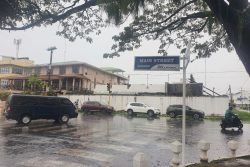The President in his New Year’s Address to the Nation would have us believe that Guyanese are living in the best of all possible worlds.
Of course it depends on who you are. Those squatters on the Parika Sea Dam and the other roughly 40% of impoverished citizens might beg to differ.
The President likes to cite numbers to make his arguments and as they say about statistics they come in different forms. Take for example his claim that the non-oil sector grew by 10% making Guyana the fifth fastest growing country in the world even if we did not have oil. Does he genuinely think all this non-oil construction of hotels and businesses that is going on would have occurred if Exxon had not discovered oil in 2015? There is an osmotic nature to the oil industry that sees tremendous spillovers into the rest of the economy and surely he must realise that. As it is this boom is centred in the urban and peri-urban areas and does not reach rural, riverain and interior communities.
Additionally he claims that his administration has “kept our promise to resuscitate the traditional sectors.” Really? Sugar production in 2019 was 90,622 tonnes; in 2022 it had halved to 47,011 tonnes despite subventions totalling $21B. Rice exports in 2022 earned US$185M, down from $222M in 2019 (granted inclement weather was a factor).
In mining despite massive tax giveaways to the industry, declarations in 2021 declined by 15% from the 2020 figure of 485,552 troy ounces. This year will likely see a similar decline as the Bank of Guyana reported that for the first half of 2022, declarations were down for small and medium scale miners by 6.4%. Of course this might be more about the utter lawlessness of the sector than a reflection of actual production but this also is indicative of a government disinclined to enforce regulations on powerful financial backers. By now any reasonable reader would see that the claim of resuscitating these three traditional sectors is hollow.
Continuing with the President’s speech he hailed that “in education, our students continue to excel at regional examinations, a tribute to the quality of the local education system.” Naturally he could not mention that 50% of students enrolled in secondary schools drop out before their final grade with five regions falling below this national average. And that half of students fail Maths at CSEC. So much for training 150,000 Guyanese to be coders. The worrying part is that President Ali might actually believe what he is saying.
Moving on he assured the nation “the best is yet to come. “In this New Year, we intend to step on the accelerator in propelling our people-centered and inclusive national agenda.” This makes us wonder whatever happened to the promised “Vision 2030’ launched at the International Building Exposition in July. Is there a document comparable to the National Development Strategy and were there any consultations with anyone on this “national” vision? Or is it simply the reheated PPP/C manifesto? Secondly, how does he expect to put the pedal to the metal when his ministries can’t spend large portions of the money they were given for capital expenditures? Aside from their capacity to execute and supervise projects, there is a shortage of materials whose prices are continuing to rise, while a tight labour market is seeing higher wages.
You have to give the President and his Cabinet a pass for effort and energy but it’s just that they aren’t that good at running a country. When one looks back since 1994 – going on 28 years minus the five-year coalition interregnum – it is hard to detect any significant progress. Maybe it was the lack of money although many other poor countries have done much better at spending the little they had. They sat on their hands on building a new bridge and addressing poverty while simply squandering millions on botched projects such as Skeldon and the airport. Now that they have more money the mistakes may in fact be even worse.
So what about instead of stepping on the accelerator we actually slow down? First and foremost what “people centred” (a meaningless term) transformation should really mean is the eradication of poverty that is non-political and reliable. Real measures of transformation should look like this: You can drink the water from your faucet and no one needs a black tank or pressure system. No one needs a generator, no one needs bars on their windows or even a gun. A woman can walk in her village or town without fear of sexual assault.
Slowing down would mean less mistakes. Take the 44-acre artificial island now growing off the mouth of the Demerara River which will literally change our national map. It is astonishing that the EPA waived the requirement for an ESIA. Anyone wishing to challenge this could simply cite Justice Harnanan’s ruling that the agency breached its statutory duty by issuing environmental permits to Schlumberger-Guyana Inc. and waiving the requirement for an Environmental Impact Assessment (EIA). Let’s hope there is a more cautious and consultative process for any such projects going forward.
It’s understandable that in our deeply flawed political system the winner takes all despite the slim margin of victory. But it feels more and more like even us, the citizens, are just tenants in the PPP’s country. It is not satisfactory. It is not in the spirit of the Co-operative Republic of Guyana and no matter how much money they have to spend if they don’t acknowledge the need for genuine inclusivity and representation for all Guyanese, the PPP/C will make the same mistakes pre-2015 that saw them lose office.




